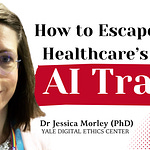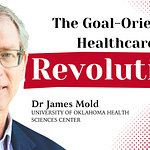"When the frontline feels we're actually offering, 'what do you need? What are the resources we can help?' We'll co-create. Of course, they don't have the control of the resources or some decisions, but that's what executives can do."
— Dr. Raj Srivastava
Listen now on Apple, Spotify, YouTube or wherever you get your podcasts.
Dr. Raj Srivastava is a pediatrician, health system leader, and implementation science researcher, serving as Chief Clinical Programs Officer at Intermountain Health. With an MPH from Harvard and over two decades of experience transforming healthcare delivery, Dr. Srivastava has pioneered approaches to scaling evidence-based practices across one of America's largest health systems, which spans 630,000 square miles (roughly the size of France, Germany, Spain, and the UK combined) and employs 64,000 people. From his early work mapping 150 million lab results across six children's hospitals to his current role orchestrating clinical transformation across 33 emergency departments, he brings unique insights into why healthcare struggles to implement best practices and how to overcome these challenges through learning health systems.
Key Takeaways
Co-creation beats imposition: Successful implementation requires working with frontline staff to understand their needs rather than imposing solutions. When clinicians feel heard and involved in designing solutions, resistance melts away.
Learning health systems require discipline: It's not just about having data or technology - it's about creating systematic approaches to identify what works, scale it appropriately, and sustain improvements over time using scientific methods.
Start with the problem, not the solution: Too often, healthcare gets excited about new technologies (EMRs, AI, big data) without first understanding the specific problems frontline staff face in delivering evidence-based care.
Systematic vs. one-off barriers: Distinguishing between system-wide challenges (like data infrastructure) and location-specific issues is crucial for effective problem-solving and resource allocation.
Trust enables speed: Building strong interpersonal relationships and psychological safety among leadership teams dramatically accelerates implementation. The "meeting before the meeting" matters.
Where to Find Dr. Raj Srivastava
In This Episode
00:00 - Introduction and why evidence-based medicine is so hard to implement in daily practice
04:47 - The gap between medical training aspirations and healthcare system reality
07:31 - Moving from descriptive research to application-based implementation science
09:05 - Transforming patient handoffs to reduce harm across multiple sites
19:32 - Systematic barriers and facilitators: Moving beyond "AI will solve everything"
23:53 - Addressing health equity through targeted subpopulation analysis
33:38 - "Build it and they won't come": The importance of co-creation and marketing
35:24 - Creating repeatable, scalable pathways for clinical improvement at enterprise scale
39:07 - Governance structures for managing clinical transformation across 630,000 square miles
41:23 - The power of pre-meeting communication and building executive trust
Referenced
Increasing Adherence to Evidence-Based Clinical Practice (Paper)
Intermountain Health, Health Delivery Institute (Link)
Contact
If you have any feedback, questions or if you'd like to get in touch, reach out at jono@clinicalchangemakers.com
Music Attribution: Music by AudioCoffee from Pixabay.
🙋♂️Hey there!
Want to help me out? Share this in your team group chat if you know someone who'd benefit! Thank you for your support.










